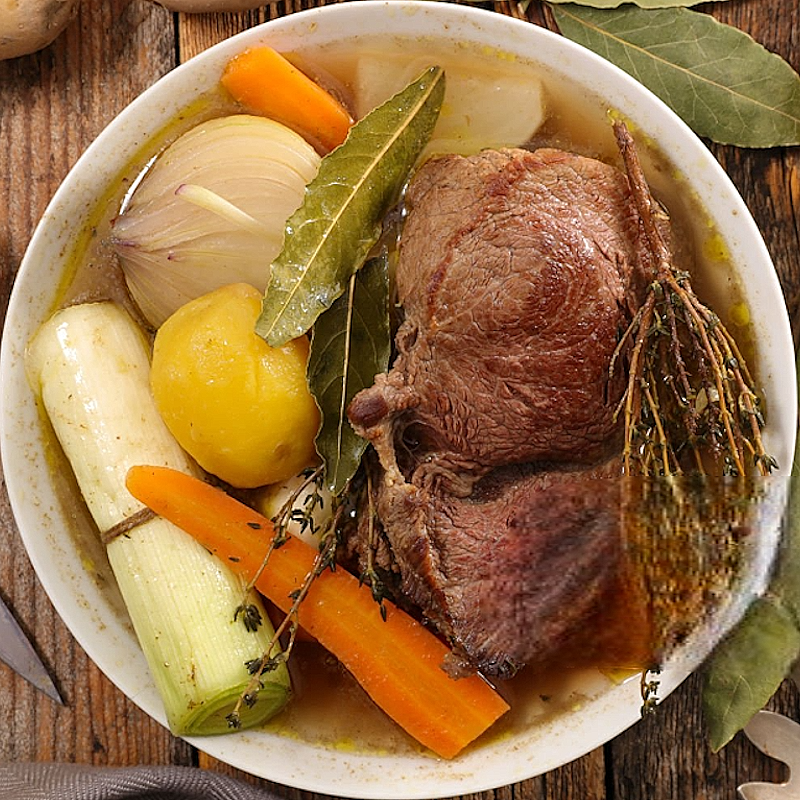La Petite Marmite by Auguste Escoffier
 Garanties sécurité
Garanties sécurité
(à modifier dans le module "Réassurance")
 Politique de livraison
Politique de livraison
(à modifier dans le module "Réassurance")
 Politique retours
Politique retours
(à modifier dans le module "Réassurance")
La Petite Marmite by Auguste Escoffier
Auguste Escoffier (1846–1935) is one of the most famous and influential chefs in the history of French cuisine. Often referred to as the "king of chefs" and the "chef of kings," Escoffier played a pivotal role in modernizing and codifying classic French cuisine. He is recognized for simplifying and structuring culinary techniques, making cooking more professional, organized, and accessible to a wider audience.
La Petite Marmite is a dish by Escoffier that, although distinct from the traditional pot-au-feu, shares similar elements. Escoffier, often considered the "king of chefs," transformed French cuisine by codifying many classic recipes. Although he did not specifically leave a recipe for pot-au-feu, his Petite Marmite evokes a simple yet refined dish, illustrating the art of late 19th-century French cooking with a combination of meats and vegetables in broth.
Ingredients:
For the Broth:
- 2 kg of mixed meats (beef, veal, poultry)
- 2 carrots
- 2 leeks
- 1 onion (with cloves)
- 2 turnips
- 1 bouquet garni (thyme, bay leaf, parsley)
- Salt and pepper (to taste)
- 2 liters of cold water
For the Accompaniments:
- 4 potatoes
- 1 stalk of celery
- 1 bunch of fresh parsley
- A few small pearl onions
- 100g of peas (optional)
Preparation:
-
Prepare the Broth:
- Place the meat pieces in a large pot and cover them with cold water.
- Slowly bring to a boil, then regularly skim off the impurities that rise to the surface to obtain a clear broth.
- Add the vegetables (carrots, leeks, turnips), the onion studded with cloves, and the bouquet garni. Salt and pepper to taste.
- Let everything cook on a low heat for about 2 to 3 hours until the meat is tender and the flavors are well developed.
-
Prepare the Accompanying Vegetables:
- While the broth is simmering, cook the potatoes, pearl onions, and peas (if used) in boiling salted water until tender. Set aside.
- Finely chop the fresh parsley.
-
Serving:
- Remove the meats and vegetables from the broth and arrange them on deep plates.
- Pour the hot broth over the ingredients in the plates.
- Sprinkle with fresh parsley and serve with the potatoes, onions, and peas as accompaniments.
Note:
Although La Petite Marmite is not quite a traditional pot-au-feu, it shares many aspects: a rich and flavorful broth with a variety of meats and seasonal vegetables. Escoffier highlighted simple yet quality ingredients, prepared with care to enhance their natural flavor. You can also enrich the recipe by adding pasta or rice for a more complete dish.
La Petite Marmite by Escoffier represents the elegant simplicity of French cuisine from his time, balancing the richness of meats with the lightness of fresh vegetables. It is an ideal recipe for a family meal or an elegant meal while staying true to the principles of French bourgeois cuisine.
Auguste Escoffier (1846–1935):
Escoffier is one of the most famous and influential chefs in the history of French cuisine.
Career and Achievements:
- Youth and Training: Escoffier started his career at the age of 13 as an apprentice in a restaurant in Nice. He later worked in prestigious establishments in Paris and London, refining his culinary skills.
- Chef at the Ritz Hotel: In 1898, Escoffier became the executive chef at the famous Ritz Hotel in Paris, and later in London, where he implemented reforms in the organization of the kitchen. He introduced the brigade system, dividing tasks among specialized chefs, which revolutionized efficiency and quality in the kitchens of major hotels and restaurants.
- Publications: He authored several fundamental works, including Le Guide Culinaire (1903), a bible of French cuisine, which codified thousands of recipes and techniques. His book was widely used by professional chefs for decades and had an enormous impact on Western cuisine.
Culinary Principles:
Escoffier emphasized simplicity, elegance, and the use of quality products. He sought to lighten traditional French cuisine by eliminating overly complex preparations and simplifying sauces while preserving the natural flavors of ingredients. He also popularized the use of basic sauces (such as béchamel, velouté, and espagnole), which remain central to classical cooking.
Legacy:
Escoffier’s legacy lives on through his contribution to the structure of modern kitchens and his ability to make cooking more accessible and professional. He trained many chefs who continued to spread his influence worldwide. Escoffier not only influenced French cuisine but also the way restaurants and hotels operate today, with organizational principles still in use in professional kitchens.
In summary, Auguste Escoffier profoundly transformed French cuisine by making it more professional, simplified, and refined. His influence remains immense in the modern culinary world, and he is still celebrated as one of the greatest chefs of all time.


